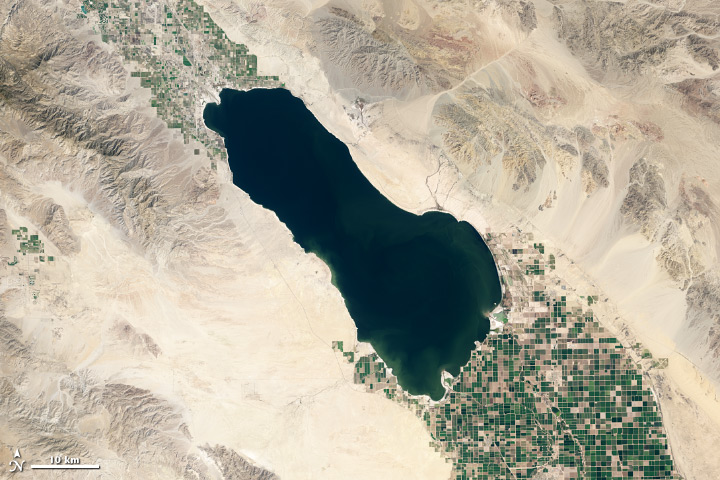Global demand for lithium is skyrocketing, and many countries are vying for dominance in the ballooning market. Fortunately for the US, it looks like a super-salty (and very smelly) lake in California is brimming with the coveted metal. However, obtaining it might be easier said than done.
The lake in question is the Salton Sea, an inland hypersaline lake in the Sonoran Desert, southern California. The body of water has previously been described as an “environmental disaster” as extreme pollution has turned its sediments into toxic dust with a foul odor of rotting eggs.
In a welcomed change of tune, discoveries at the lake suggest it could help the US transition away from fossil fuels and towards renewable energy systems involving batteries, of which lithium is a key ingredient.
The Salton Sea region could hold as much as 3,400 kilotons of lithium, enough to support over 375 million batteries for electric vehicles, according to an analysis by the US Department of Energy (DoE) published in November last year.
“Lithium is vital to decarbonizing the economy and meeting President Biden’s goals of 50 percent electric vehicle adoption by 2030,” Jeff Marootian, Principal Deputy Assistant Secretary for Energy Efficiency and Renewable Energy, said in a statement.
By looking at the geological history of the region, it’s possible to see how the abundance of lithium ended in the lake.
As per the DoE report, much of the metal likely originated in the surrounding mountain ranges of the Imperial Valley, lithium-rich volcanic rocks and igneous intrusions from past geologic activity, and water and sediments carried by the Colorado River.
Additionally, various other processes may have concentrated the lithium in the lake water, such as the evaporation of lithium-bearing waters flowing into the basin and the leaching of lithium from rocks by geothermal brines.
A satellite image of the Salton Sea In southern California on March 24, 2013.
Image credit: Landsat/ NASA / USGS
Many industrialists and politicians were very happy to hear about the news of vast lithium deposits in the region. California Governor Gavin Newsom has vowed to turn the so-called “Lithium Valley” into a “global hub for battery production,” all while improving the environmental health of the Salton Sea.
Nevertheless, there are some doubts about how to obtain the much-hyped resource from the lake.
Typically, the metal is harvested through the evaporative extraction of lithium-infused brines, which requires a lot of energy and infrastructure. Conversely, the planned lithium extraction at the Salton Sea will build on the infrastructure of existing geothermal power plants. As it stands, hot brine is pumped from geothermally active layers as deep as 2.5 kilometers (1.5 miles) below the surface. The steam from this brine powers turbines to generate electricity, and afterward, the brine is returned to underground aquifers. The new approach aims to extract lithium from the brine before it’s reinjected.
There’s just one problem: no one has successfully processed lithium brine in this way before.
Although the newly proposed method promises to be greener than conventional means, some local residents are worried that the project could be ushered through with urgency before the proper safety checks are met.
“The industry and counties were supposed to host a lot of outreach meetings on the projects, but there haven’t been that many, and there hasn’t been a single one conducted completely in Spanish. That’s a real problem because many residents only speak Spanish. Meanwhile, the approvals seem fast-tracked. No one knows what’s going on, and there’s been little effort to correct that,” Daniela Flores, executive director of the Imperial Valley Equity and Justice Coalition, told the Cal Alumni Association.
Source Link: A Californian Lake May Hold 3,400 Kilotons Of Lithium – But Can We Access It?
